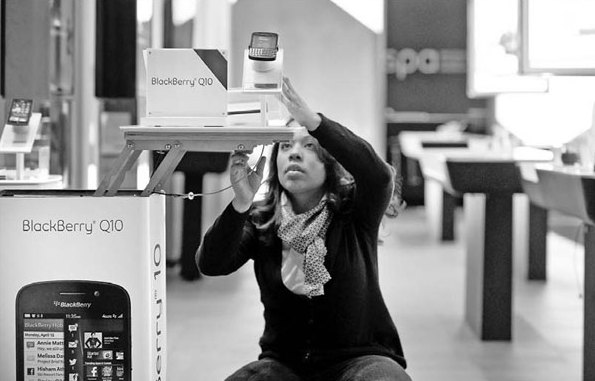Who's going to pick BlackBerry?
Updated: 2013-08-15 07:34
By Gao Yuan (China Daily)
|
||||||||
|
Among the top potential buyers of BlackBerry, Lenovo and Huawei are the most likely because they are willing to enter the global consumer electronics market, experts said. Galit Rodan / For China Daily |
Analysts believe Lenovo, Huawei could be bidders
Buying struggling BlackBerry Ltd would help a Chinese smartphone vendor to build a stronger global presence in the short term, analysts said on Wednesday, adding Lenovo Group Ltd and Huawei Technologies Co Ltd could be the top bidders for the Canadian company.
In addition to possessing a huge number of patents in the smartphone sector, BlackBerry's long-accumulated expertise and resources in product development, operating systems, channels, operator relationships, brand and management are valuable assets for Chinese companies that want to build a serious presence outside China, according to Nicole Peng, research director of research company Canalys China.
The comment came after the company, based in Waterloo, Canada, said this week it is considering selling itself to another smartphone maker.
The company decided to explore "strategic" options because its long-awaited latest device failed to grab enough market share after its release in January.
The global market share of BlackBerry devices declined nearly 12 percent year-on-year in the second quarter, data from the United States consultancy IDC showed. It is still early days for the new platform and BlackBerry will need time and resources to attract more end-users, according to IDC.
Among the top potential buyers of BlackBerry, Lenovo and Huawei are the most likely because they are willing to enter the global consumer electronics market, experts said.
Lenovo said in a statement on Wednesday that the company may beef up its consumer electronics arm through mergers and acquisitions. But the company did not name any potential target.
Huawei Technologies was not available for comment on Wednesday.
Bryan Wang, vice-president and principal analyst at Forrester Research Inc, said Lenovo started to talk to BlackBerry executives at least a couple of months ago.
"This deal makes good sense for Lenovo and is critical for Lenovo to execute its strategy in the post-PC era," said Wang. BlackBerry's design ability, good relationship with telecom operators plus its strength in the enterprise smartphone segment will boost Lenovo's smartphone unit globally, he added.
The company's major overseas smartphone markets include India, Russia, Indonesia and Vietnam.
However, there were concerns from day one that the Canadian and US governments may block a Chinese company buying BlackBerry, Wang warned. Western countries tend to deny Chinese IT companies' acquisition requests because of "security concerns", he said.
"Because BlackBerry's biggest customers are enterprises, financial institutions and government organizations, potential buyers from any nation should have a similar profile to BlackBerry in this sector and be trusted by their customers, who have high-level security requirements," said Peng.
"Therefore there is added difficulty and complexity when BlackBerry is searching for the right buyer."
Huawei may benefit from the BlackBerry patents, but the price tag might be too high for the telecom equipment maker based in Shenzhen, Guangdong, to take over the whole company. The security issue is even more serious for Huawei, according to Wang from Forrester.
Both Lenovo and Huawei started vigorously tapping into the smartphone market this year.
The companies launched their own flagship gadgets in May and June, targeting high-end users.
Lenovo now terms itself the biggest local smartphone maker in terms of shipments. It plans to sell 100 million terminals - including smartphones and tablets - before the end of this year.
South Korean smartphone giant Samsung Electronics Co Ltd was the biggest vendor in China, taking nearly 20 percent of the market share, while Lenovo and Huawei each took about 10 percent, said industry research firm Strategy Analytics.
gaoyuan@chinadaily.com.cn
(China Daily USA 08/15/2013 page15)

 Spielberg has desire to work with Zhang Yimou
Spielberg has desire to work with Zhang Yimou
 Requiem ceremony for former comfort woman
Requiem ceremony for former comfort woman
 Egypt forces crush protesters
Egypt forces crush protesters
 Two killed in fiery crash of UPS cargo jet
Two killed in fiery crash of UPS cargo jet
 Yao dreams of sports for fun with towering charity
Yao dreams of sports for fun with towering charity
 Re-enacting ancestors' journey to the west
Re-enacting ancestors' journey to the west
 Special bus seat for breast-feeding mothers
Special bus seat for breast-feeding mothers
 Northern exposure
Northern exposure
Most Viewed
Editor's Picks

|

|

|

|

|

|
Today's Top News
US asks China's help on DPRK issues
Movie tax flack is settled
Manning 'sorry' for US secrets breach
China to be world's No 1 consumer
Gold rises on physical buying from Asia
Millionaires hold dimmer view: Survey
China to probe foreign automakers
Snowden case not to affect US-Russia talks
US Weekly

|

|






